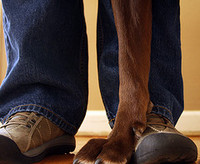Caring for animals may have influenced human evolution
The term "man's best friend" may have a whole new meaning, according to new research.  Animals - primarily dogs - have played an integral role in the evolutionary process of humans, according to Pat Shipman, a professor of biological anthropology at Penn State University. Humans have always had the urge to nurture, and in a paper published in August 2010 issue of Current Anthropology, Shipman notes that the "animal connection"  goes beyond the warm fuzzies that we feel.
As resourceful as humans are, the mental and physical abilities that we possess have always served us well - but there have been limitations to what we could do. For one, we weren't very good predators, putting us at a great disadvantage. Shipman explains that the timeframe that humans started using stone tools - 2.6 million years ago - enabled humans to be on a more level playing field as other carnivores.

flickr photo courtesy of mulmatsherm
In a press release, Shipman goes on to say that the urgent need to convey information with regard to the advantageous practice of domesticating animals arose and eventually led to the evolution of language. This progression seems to have begun with artwork on walls of caves - which was typified by drawings of animals, not people, and led to the use of symbols and, in time, language.
An interesting thought: Did members of the human species that kept canines, then, have a better chance of survival over those that did not? Could that have changed the evolution of humans?
The relationship between humans and canines has endured due to, in many ways, necessity, but the very definition of necessity has evolved, it could be said. Where would both species be now if this alliance wouldn't have been forged?
Dogs have come to teach us in some ways to be more human, resilient and resourceful. Humans have to a vast degree helped the proliferation of the canine species along.
That being said, what does the future hold for our respective species?
Lorrie Shaw is a regular pets contributor on AnnArbor.com, pet blogger on More Than Four Walls and owner of Professional Pet Sitting. She frequently writes about the fascinating bond between animals and humans as well as other social issues connected to animals. She welcomes your contact by e-mail.


Comments
SillyTree
Tue, Sep 21, 2010 : 3:30 a.m.
Evolutionary processes of any significance almost always occur over vast time frames. These time frames are much greater than the 40,000 years or so that humans could have been working with dogs. Some would argue that the dog has evolved from the wolf in just that short of a time frame, but this has been called into question and reputed. The variance of phenotypes among canines is much greater than the variance in genotype in the same group. The differences in appearance are due to other factors than mutated genes. I don't doubt that working with animals helped humans to develop their culture, but it was with the genes they already had and not due to evolution. Evolution is a misused term and it causes confusion amongst non-scientists when it is misused. It also gives fodder to people whose power is dependent on debunking science.
treetowncartel
Mon, Sep 20, 2010 : 11:19 p.m.
Hopefully, it brings us a world where people appreciate domesticated animals.
Soothslayer
Mon, Sep 20, 2010 : 8:06 p.m.
Cat Stevens sang it best: http://www.youtube.com/watch?v=y2Hjx7O7NZk
bunnyabbot
Mon, Sep 20, 2010 : 4:06 p.m.
well I can say I don't trust people that don't like dogs and don't like people my dog doesn't trust. I can add I could not live in a world without dogs!
braggslaw
Mon, Sep 20, 2010 : 3:16 p.m.
Caring for animals gave Eurasians the biological advantage by immunizing them to small-pox and other infections that originated in domestic animals. Small-pox was the main destroyer of new-world populations. See Guns, Germs and Steel by Diamond. It is opiniated and I believe it minimizes the advantages of culture and overstated the advantages of geography.